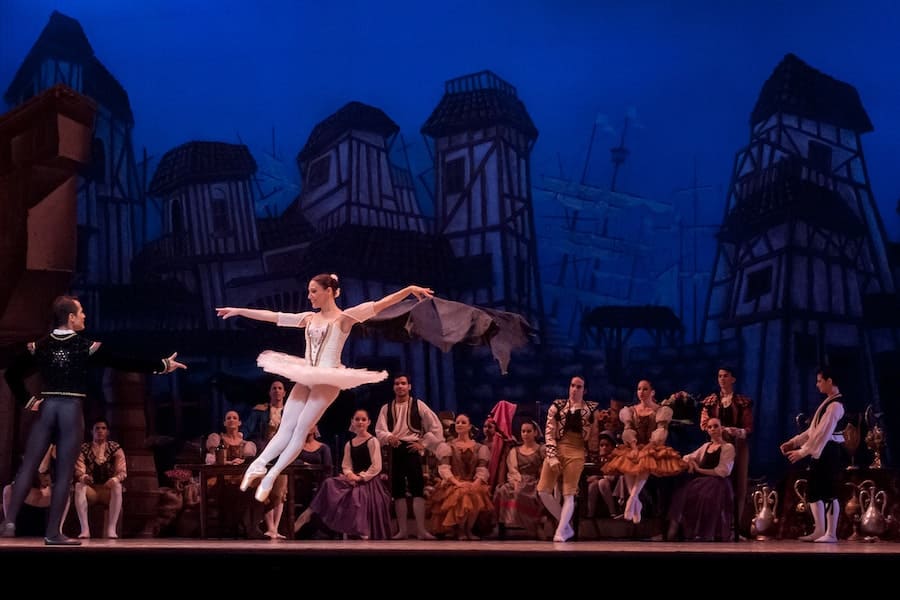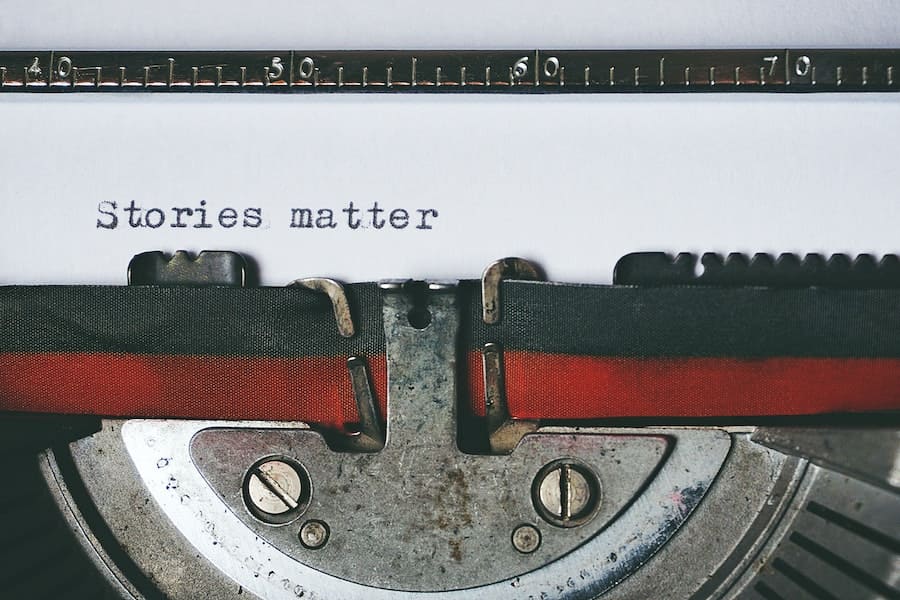Want some tragicomedy examples that are a little bit bitter but with a side of sweet?
We’ve got them, a few famous ones from literature and film.
We will also take you on a quick history of the literary device and show you how authors have used tragicomedy to capture mankind’s paradoxical nature.
And hopefully, at the end of this post, you’ll know it’s ok to be a commitment phobe when it comes to choosing a genre for your next piece.
If tragedy is too dark and comedy too light, dance with both and write a tragicomedy.
You don’t have to follow any rules but your own.
After all, real life has been known to be bitter and beautiful, fitful and funny.
Let’s begin!

Definition & History of Tragicomedy
Not strictly a literary device, tragicomedy is a genre of literature containing tragic and comic elements.
Tragedy, the brooding parent of tragicomedy, is known for its intense nature and devastating endings. It follows a flawed, high-ranking hero who allows that nasty character flaw to destroy their life.
While comedy, the cool parent of tragicomedy, is all fun and games. It contains mistaken identities, possibly cross-dressing, and always a love story.
Tragedies end in death; comedies in marriage.
A tragicomedy, therefore, mixes serious and silly.
It’s like the literary device comic relief only extended to the entire piece.
Renaissance Revivals: Tragicomedy in Italy
Tragicomedy was coined by the comic Roman playwright, Plauto.
But it was two Italian Renaissance thinkers and writers, Giovanni Battista Girardi Cinthio and Giovanni Battista Guarini who matured it.
Cintho did so by craving a new genre based on Roman (not Greek) comedies and tragedies. He believed tragedies with happy endings were better suited for stage, and tragedies with sad endings were better read.
Cintho’s tragicomedy allows typically comedic characters, such as commoners and scumbags, to experience tragedy, rather than royalty whilst getting a happy ending.
Later that century, came Guarini’s controversial tragicomedy makeover. His tragicomedies are pastoral, contain scenes neither too tragic nor too comedic, and feature characters with manners. These aspects stuck with the genre for over a century.
Tragicomedy in England
Across the pond in England, Philip Sydney lamented the birth of the tragicomedy, calling it a “mungrell” in the 1580’s, and he didn’t mean it in a good way.
William Shakespeare voiced his opinion on the matter through Polonious, arguing “Seneca cannot be too heavy, not Plautus too light.”
Take that Sydney.
In 1608, John Fletcher adapted one of Guarini’s plays, adding his own definition of the term:
“The genre is determined by whether or not it contains death.”
A tragicomedy only gets close to death.
But it is William Shakespeare (shocker) who creates a few notable tragicomedy examples with The Merchant of Venice, The Winter’s Tale, and his final play, The Tempest.
3 Examples of Tragicomedy from Theatre

The evolution of theater, from the strict forms of classic tragedy and comedy to the hybrid of tragicomedy, happened as a result of our own cultural evolution.
As mankind changed, so did our appetites for entertainment.
Our preferred mode of entertainment also evolved from stage to screen, but as we dive into tragicomedy examples, let’s first look at some notable stage productions…
The Merchant of Venice
While some call this play a “problem play” or “romantic comedy,” others will classify it as a tragicomedy.
First, the tragic element.
The plot centers around the ruin of a Jewish Monylenderer, Shylock. He fufills the classic requirements of a tragic hero: he is prosperous, he has a character flaw (materialism), and he allows that flaw to destroy his relationships.
By the end of the play, he is publicly humiliated and forced to renounce his faith or his fortune.
The so-called Christians in the play do not behave as such making the play a bit harsh for a comedy, ergo tragicomedy.
But we see a harsh side of Shylock as well as he demands payment in a “pound of flesh” and part of us appreciates his punishment even if it is far too severe.
Comedically speaking the play has scenes of levity (see Shylock as a buffoon and Lancelot the clown), witty dialogue, disguise and cross dressing.
There are plot twists, separated lovers, family pranks and drama, and of course, marriage. Just about everyone in a couple is reunited and married off.
It’s a tragedy for Shylock (and arguably Antonio), a comedy for everyone else.
Marriage a la Mode
John Dryden’s 1672’s Marriage a La Mode, or The Fashionable Marriage, presents the audience with three “loving” relationships and asks which ideal.
The first relationship is the most serious, told through heroic couplets so it sounds serious too. It centers around Palmyra, a usurper’s daughter and current princess of Sicily, and Leonidas, the rightful heir. Their upcoming wedding will heal Sicily of the pain created by Palmyra’s father. This is the stuff of tragedy.
The second love story is the main source of comedy in the play.
It’s a love square, if you will, between the bored but in-it couple of Mr. Rodophil and Mrs. Doralice and the engaged couple Melanthe and her jealous bridegroom Palamede.
To make a long play shorter, Rodophil wants Melanthe, and Palamede thinks Doralice is quite fetching.
Needless to say, things get messy, couples get flipped, and shockingly, both pairs decide to stay where they started.
Maybe true love can survive anything.
Waiting for Godot
Written by Nobel-prize winning Samuel Beckett in 1949, Waiting for Godot shatters the dramatic form with its open rejection of its strict requirements.
Beckett’s play explores existentialism, basically the idea that nothing is certain except death and your experiences and the only way to fully live is to accept this fact and move on.
Tragic, yes?
But where’s the laughter promised by tragicomedy?
The plot encircles protagonists Didi and Gogo who are, you guessed it, waiting for their no-show friend, or god-figure, Godot (see God in there?).
They spend the whole play waiting for this guy because they can’t (or won’t) accept the fact, they don’t actually have to wait for him. And they plan to wait for him again the next day.
Isn’t the definition of insanity when you repeat the same action expecting a different result?
Hmmm.
They are joined by Lucky and Ponzo, (a man-pet?) and his master. The four men proceed to do a whole lot of nothing.
Act 2 is a repeat of Act 1, only now Lucky is mute and Ponzo is deaf. The plot and the characters literally go nowhere as a profoundly depressing representation of man’s existence.
As you watch Didi and Gogo, you want to scream, “Go!”
Equally, part of you wants to scream at yourself, “Leave! This is lame!”
But Beckett mesmerizes us; we see ourselves in Didi and Godo and their decision to stay, and stay, and stay.
3 Examples of Tragicomedy from Film

As film is the flashy cousin of theater, we must look at tragicomedy on the big screen.
Tragicomedy is a popular genre for screenwriters, probably for the same reasons the Guarinis, Shakespeares, and Becketts of the world loved it on the stage.
Tragicomedy is how we get through the hardships of life.
So, let’s dive in.
O Brother, Where Art Thou?
One of the Coen Brothers biggest hits is the 2000 film “O Brother, Where Art Thou?”
Set in the American South during the Great Depression, three convicts escape their chain gang and set out to find treasure promised by one of them.
George Clooney stars as Ulysess (yes, the same Odyssesus from 9th grade English class), the charming convict who has convinced his brothers o’chain, Delmar and Pete, to risk death and escape with the hope of getting rich quickly.
Their journey, modeled after that 9th grade text The Odyessey, is filled with exaggerated characters from the classic hero’s journey. There is much to laugh at: Ulysses is obsessed with his Dapper Dan hair pomade, Delmar gets turned into a toad, and John Goodman is a Cyclopian politician.
Wait, what?
But where is the tragic part of this tragicomedy example?
There is no treasure. Ulysses is a liar and a deadbeat father of many daughters. The whole thing was a ruse to stop his wife from remarrying. The somber setting of The Great Depression and a cameo by the KKK also contribute to the tragic scale.
And it works.
Comedy.
But ouch for Delamar and Pete.
And poor Penny, sternly portrayed by Holly Hunter, deserves better than Ulysses.
Tragedy.
Juno
The 2007 film by Jason Reitman with screenplay by Diablo Cody, Juno is a romantic tragicomedy that traces the bildungsroman of pregnant teen, Juno, played by Elliot Page.
(But before we continue, we have to pause and chortle. Why? Because the first two film examples contain Greco-Roman allusions. Just as Ulysses is the Roman name for Odyssesus, so too is Juno the Roman name for Hera, the Queen of Olympus and the goddess of the marriage, women, and family.)
Back to the film, Juno’s first and lack-lustre sexual encounter with her BFF Paulie, results in pregnancy.
Tragedy.
She distances herself from Paulie.
Tragedy.
She considers abortion.
Tragedy.
She chooses adoption, not tragic but also not comedic, and goes about to find the perfect parents for her baby in the local Pennysaver.
Comedy. She finds them. Comedy squared.
But things are not as they seem. Spoiler?
Kinda.
Like traditional comedies, there are mistaken identities. The adoptive dad isn’t what he seems, the mom is better than she first seemed, and Juno is actually in love with her baby’s biological father.
Cool, right?
Happy ending? Tragicomedy anyone?
Close, happy adjacent.
Let’s just say the good people get rewarded and leave it at that.
Big Fish
Our last modern tragicomedy example is the 2003 film Big Fish, directed by Tim Burton and based on the novel by Daniel Wallace.
The theme of this one is overtly tragic, the reconciliation of a dying father and his son, as told through a series of fantastical vignettes spanning Will Bloom’s life (the son).
Bothered by his father’s need for attention and his over-the-top stories, Will and Edward have fallen out.
Tragedy.
As the cancer progresses, Will returns home to both say goodbye to his father and try to find the real man in the fantastical stories of Will’s childhood.
He recounts his father’s stories to his new wife, to Edward as he fades, and finally, from a place of acceptance, to his own young son.
Tragedy, tragedy, comedy.
Because there’s a baby.
There is a witch, a giant, a circus, a werewolf, and conjoined twins.
Comedy, comedy, comedy.
Who all end up being regular-ish people enriched by Edward’s presence in their lives.
Tragicomedy.
Tragicomedy Examples, Where Can They Take You?

By now you understand the nuances between tragedy, comedy, and their hybrid offspring tragicomedy.
But so what?
So what?!
Take the wisdom those writers saw in the form and harness it for your own writing.
As a writer, you are beholden to none. Don’t let strict definitions of genres curb your creativity.
Write what you want to write.
Dabble with tragicomedy and see if its truth, bitterness and beauty, pain and pleasure, matches your truth.
Happy writing!



